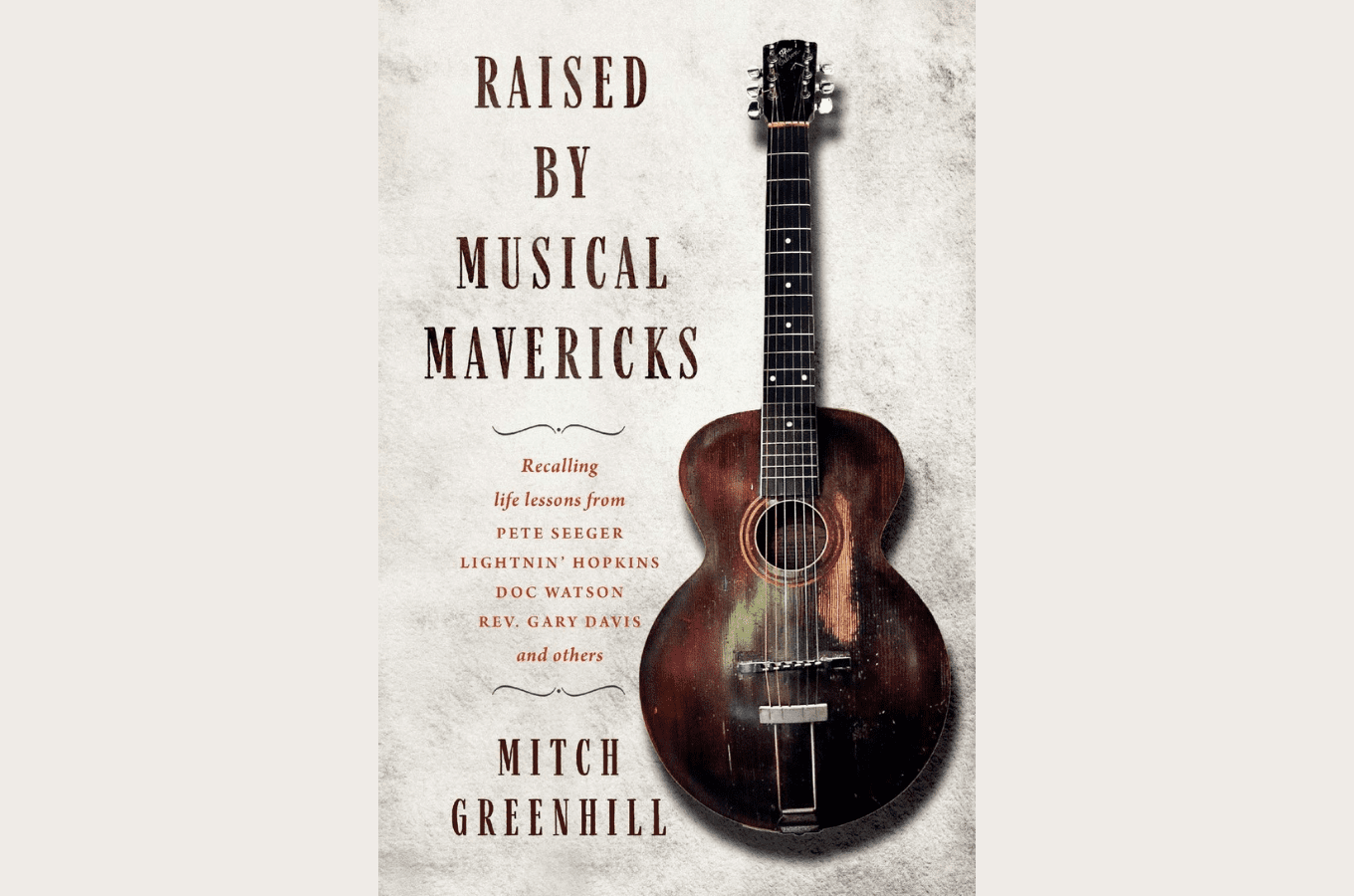THE READING ROOM: Memoir Offers Lessons from Pete Seeger and Other ‘Musical Mavericks’

Musician, composer, and producer Mitch Greenhill has led a charmed life. His father, Manny, founded Folklore Productions in 1957, which led to parade of artists including Rev. Gary Davis, Peter Seeger, and Sonny Terry passing through the Greenhill house. As he grew up, he learned guitar licks from Davis, went ice skating got tips on songwriting and harmony from Peter Seeger, and visited the Village Vanguard with his “Uncle” Steve Gardner — a professional stage manager — where he saw Miles Davis and John Coltrane. In his warm and entertaining autobiography, Raised by Musical Mavericks: Recalling Life Lessons from Pete Seeger, Lightnin’ Hopkins, Doc Watson, Rev. Gary Davis and Others, Greenhill recalls this special sense of inclusion he felt “when an informal tribe of musicians started visiting our family and sleeping in the spare bedroom. They … surrounded and embraced me within their magic circle.”
Although Greenhill was still young during these first interactions, he remembers a lot and recognizes how special those experiences were. He writes, “it was always clear to me, from the first time Pete Seeger and Sonny Terry stepped into our living room, that these artists would be important to me, though I did not comprehend how. It was this tribe of musicians who gave welcoming and sometimes challenging support to this curious kid…they opened my heart and showed me a way forward.”
Greenhill recalls being entranced by music when he was 5 years old and his mother took him to hear Paul Robeson. Even then, he knew that he “want[ed] to explore that world” and to “get inside that music.” A few years later, she took him to see Sister Rosetta Tharpe. Those two concerts, he writes, blossomed into a passion for music that grew quickly and was nourished by his father’s Folklore Productions. “In this new life, he becomes first a presenter of musical artists, and then their booker and manager. In this musical garden, I am nourished by a series of gifted mentors … they change my life by opening new ways of listening, and new ways of envisioning a future that would have, in their absence, been far different.”
When he was a teenager, Greenhill’s family moved from Brooklyn to the Boston area. There, his father Manny opened a new folk club, The Ballad Room, with George Wein, who founded of the Newport Jazz Festival. Performers that played the club during the opening months included Sonny Terry and Brownie McGhee, The New Lost City Ramblers, Barbara Dane, and Willie Dixon. According to Greenhill, “Willie takes a liking to me, shows me some blues subtleties, and tells stories of the Chicago scene…He has a big spirit with a welcoming joie de vivre that encourages me, draws me out.” Greenhill makes his own debut at his father’s club, playing banjo for the early audience, delving into Pete Seeger songs and Woody Guthrie ballads. “It’s a heady experience: making music, performing, and yes, the applause.”
When the Rev. Gary Davis stayed with the Greenhills, Mitch had the opportunity not only to witness, but also study Davis’ guitar playing style. Greenhill recalls with humor that Davis would often ask Greenhill’s mother, Leona, to sanctify his coffee, and his mother would pour a shot of whiskey into Davis’ cup. Greenhill also took guitar lessons from Davis, calling him, “a good teacher.”
Davis taught him “the unique fingerpicking pattern he employs on ‘Candy Man,’ one of his signature pieces,” Greenhill writes. “In a sense, it reverses Travis picking [a traditional way of fingerpicking that alternates the thumb on bass notes], in that Davis’s thumb starts on the higher bass string, then the lower. (Travis always moves low to high.). But then the Reverend shows me a four-note bass run that offers an escape route, a way to a more traditional pattern, low to high. It’s kind of patting your head and rubbing your belly at the same time.”
When he was 23, Greenhill left Cambridge (having graduated from Harvard) and followed Geoff and Maria Muldaur on a Jug Band tour. He started a country-rock band, The Frontier, with Mayne Smith and Mark Spoelstra, which taught him all kinds of new types of plyaing and audiences. He recalls, “In this country-rock band I learn the pleasures of playing for dancers and finding a common rhythmic bond between the bandstand and the dance floor…When it’s my turn to take a guitar solo, I step forward on the bandstand and put my finger on the instrument’s neck…I feel the presence of my mentors: Pete Seeger’s balance and empathy, Rolf Cahn’s theory and practice, Reverend Davis’s Saturday night and Sunday morning, Eric von Schmidt’s approach to life as one big art project. I experience again the torn loyalties of Merle Travis’s lure, Lightnin’ Hopkins’ strutting pride, Jackie Washington’s fraternal protection, Geoff Muldaur’s wealth of hipster knowledge. I close my eyes and put these into my guitar solo. And I feel that I have at last gotten inside the music.”
The most poignant story in the memoir involves Greenhill’s relationship with Doc Watson. Greenhill first met him at the Newport Folk Festival: “to me, a northeastern city boy just entering college, [Doc’s music] provides a window into a beautiful world of southern mountain music, deep family ties, and a close relationship with nature.” When Greenhill joined Folklore Productions, he started booking Watson and his son, Merle. Eventually he started playing in Doc’s band. As Greenhill writes, “Doc shows me that getting meaning from one’s life is more than getting meaning from one’s music. His music is embedded in his life, not apart. His is a life in balance and in context.”
Ultimately, Raised by Musical Mavericks: Recalling Life Lessons from Pete Seeger, Lightnin’ Hopkins, Doc Watson, Rev. Gary Davis and Others offers a powerful glimpse into the ways that music shapes our lives, and the ways that artists create a community from which they draw inspiration and vision.




